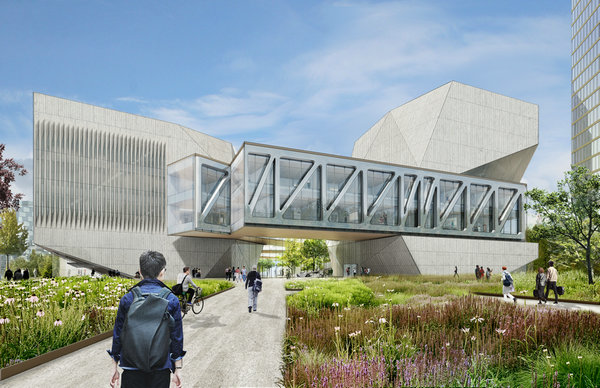 |
|
A drawing of the Tianjin Juilliard School's main entrance. [Photo provided to China Daily] |
Tianjin Conservatory of Music president Xu Changjun says: "The project, an acknowledgment of the growing market for classical music in China, will offer more opportunities to Chinese music students and even students from East Asian countries."
About six years ago, the Juilliard School was introduced to its partners in Tianjin: the Tianjin Conservatory of Music, the Tianjin Binhai New Area CBD Administrative Commission and the Tianjin Innovative Finance Investment Co.
The deal for the school was announced by Polisi when China's first lady, Peng Liyuan, visited the Juilliard School in New York on Sept 28, 2015, while accompanying President Xi Jinping on his weeklong state visit to the United States.
The Juilliard School, founded in New York in 1905, has trained some of the world's best artists, including Van Cliburn, Renee Fleming and Yo-Yo Ma.
The Juilliard School has enrolled students from China since the 1920s.
Now, 30 percent of the students at the Juilliard School in New York are from outside the US. Currently, students from China form the largest single group of overseas students in the school.
There are about 70 students from China, most of whom are in the music division.
Alexander Brose, the former vice-president for development at the Aspen Music Festival and School, was appointed as executive director and CEO of the Tianjin Juilliard School, while Chinese-American violinist He Wei is the school's first artistic director.
As for his plans, Brose says: "Before the school in Tianjin officially opens in 2019, we will arrange a series of activities as a warmup, such as Juilliard orchestras touring in China and forums in Tianjin."
Violinist He, who was born in Chengdu, Sichuan province, and trained at the Sichuan Music Conservatory before going to the San Francisco Conservatory of Music, will build the school's resident faculty and plan its artistic programs.
He has been teaching at the San Francisco Conservatory of Music for about 20 years.
In 2011, he helped initiate the annual San Francisco-Shanghai International Chamber Music Festival with the Shanghai Conservatory of Music.
"During the past decades, I have frequently traveled to China to work with local conservatories," he says.
He will move to Tianjin along with his wife this August to start recruiting resident faculty members.
"I am looking forward to fostering artistic ties between China and the US. For example, we will mix Western and Chinese instruments in our performances," he says.
Contact the writer at chennan@chinadaily.com.cn